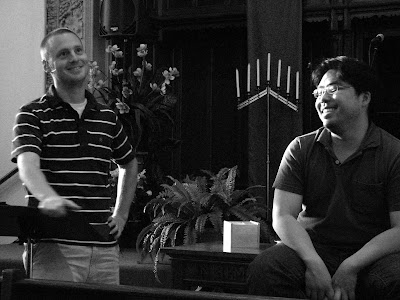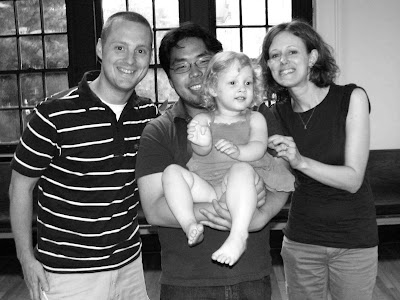 In planning my transition to full-time employment, I've had to determine what tasks are critical for me to perform in my ministry at Echo; more specifically: what jobs can I give up so that I can be released to do those things that only I can do? The most critical thing for me to do each week is to prepare my sermon.
In planning my transition to full-time employment, I've had to determine what tasks are critical for me to perform in my ministry at Echo; more specifically: what jobs can I give up so that I can be released to do those things that only I can do? The most critical thing for me to do each week is to prepare my sermon.
This is somewhat peculiar to verbalize, but it is very true: the most important task I perform every week is the forty minutes of teaching I deliver in the pulpit. It's here that I instruct, inspire, and pull-together our church so that we can be all that God needs us to be. It's a job I take very seriously, a craft I've been developing over the course of twenty years.* It's never easy, but it's something I absolutely love. That's why I try to stay up-to-date on the latest trends in preaching.
The state of preaching in the Protestant Church has changed greatly in the last two decades. A more "seeker-sensitive" approach has transformed the way that most pastors teach from the pulpit. Gone [for the most part] is in-depth biblical exploration, replaced by elongated metaphors, personal stories, and needs-based instruction. The result of this shift is that preaching has become less about content and more about delivery. Basically, if you are a good storyteller [even if the story has nothing to do about anything] then you can be anointed a good preacher.
Another trend that's emerged in the last ten years is the elevation of a certain core of speakers to the status of preaching superstars. Now this trend is nothing new, as there have always been certain preachers who have received national attention. The difference now is two-fold: 1) popularity is directly connected to church size, not necessarily content and giftedness; prevailing wisdom dictates that if you can draw a large crowd then you must have something important to say. 2) The iPod era has allowed churches to disseminate their sermons/resources with great ease. Add this to the fact that most pastors are bloggers, and these pastors name-drop other "cool" pastors, and an entire network of hip preachers are lauded for their contributions.
Finally, the megachurch era has proved that church expansion can be an incredibly costly endeavor. Constructing a building that seats several thousands is not entirely practical as the expenses are astronomical. With the development of better video technology, churches decided that they could simulcast [or multi-site] their services for the masses and the people would still show up. Since many larger churches used some video technology to zoom in on the speaker anyway, what difference would it make to watch an entire sermon on video? Video venues are the "it" thing among growing churches now, and it has enabled megachurches to grow much larger than they could ever have imagined. My prediction as a result of this video venue revolution: there will be an 100,000 member church in the USA in my lifetime.
While progress is usually great, it is sometime detrimental. These trends are transforming the act of preaching, raising the performance bar to a level higher than it has ever been. This, I assert, is not good. Preaching is an incredibly intimidating act: spending the week preparing a message that people need to hear [as opposed to what they want to hear], standing in front of the church and delivering it while some obviously couldn't care less about what you're saying, waiting after the sermon to hear feedback, and then receiving the random email the following week questioning your assertions, then doing the whole thing all over again the following week. It's a tough gig. While there will always be type-A personalities who are up to this challenge, some people who should be preaching are discouraged, feeling inadequate, and choose an entirely different vocation.
And this new era of superstar preaching has made this inadequacy even worse. Now, to hear an incredible speaker, I don't necessarily have to live anywhere near him to do so; I can just go to the nearest "campus" and eat it up.** And since people in the pews can go online and hear the best preachers from all around the country, they're better informed as to what "good preaching" sounds like. When the local preacher doesn't measure up, some will claim that they are not "being fed" and will go elsewhere.
This might sound like sour grapes, but I'm not convinced this is a good idea. And this is best illustrated by the recent unveiling of videoteaching.com. This website will provide free sermon videos of some of the best preachers in the country to be downloaded and shown in churches. They have a list of reasons why this is a great things for churches, but it's merely spin. I propose that, while it might fill the preaching time on Sunday morning, this is a horrible idea. A few reasons:
1. It restricts the act of preaching to a precious few. And the fewer people that are able to work on the craft and preach some terrible sermons, the less likely that they'll ever preach a good one. Preaching is trial and error; you don't become good at it unless you practice as you go. If we only let the superstars play, the minor league system will dry up.
2. It eliminates the important contexts of location and life. A friend of mine pastors a church that only shows videos of another preacher during the sermon time. He's criticized his "video preacher" for including information that could date the sermon he's preaching [ex: what if the minister remarks about a snowstorm that week but they don't show the video until summer?]. Additionally, a guy preaching to his church in a suburban city in the Bible Belt isn't necessarily going to be able to speak to our church in urban Cincinnati. One of tools that the local preacher can wield is a story from the headlines of the local paper— capturing a thought for Christ. This cannot happen over video.
3. It downplays the act of preaching. In 1 Corinthians 1, the apostle Paul discusses the foolishness of preaching. Yes, it seems odd to give so much importance to this act, but God definitely works through it. If we who pastor are content to pass off the responsibility to someone else, thinking that we can "put more energy into reaching [our] community by freeing [us] from weekly message preparation," then we have essentially given up on something God believes in. Sure, we might be horrible at preaching, but it's not about our skill anyway. It's about elevating Jesus so He shines above everything.
Unfortunately, it seems there's nothing we can do to stop this superstar/video movement . . . for now.
Eventually, people will be overloaded on video preaching. One day it'll be novel to listen to an actual person preaching a real sermon that they themselves wrote. Things always come full circle.
So while popular preaching is headed in a direction much different from that of my own, I'm going to hang out and do my own thing. Plus, I have an amazing church who absolutely "get me" and always come back regardless of how harsh I can be while preaching.
And for you in the pews, cut your preacher some slack. When he lays an egg in the pulpit, show some sympathy. Try encouraging him a little. Let him know when he says something that challenges you. As I've previously stated, it's a tough gig. Before you run off to the next hippest thing down the road, be a little patient and see what God is saying through your very imperfect pastor.
That said, I really need to get my sermon for Sunday finished . . .
_______
*Yes, I delivered my first sermon at the age of 12. I'm not saying it was very good, but that's when I got my start. One of the blessings of growing up in a smaller church was the ability to hone my preaching even before I went off to seminary; by the time I went off to college, I had probably preached fifteen to twenty times. This opportunity gave me a head-start, allowing me to feel incredibly comfortable speaking in public as well as increasing my efficiency in preparation.
**Multi-site churches are starting to really take off, even outside of a church's city. There's a certain church in Texas that opened up a new campus last year in Miami, Florida.
***Think about how dedicated Christians were in former eras. For centuries, people weren't nearly as transient as they were today. In most cases, you never left the town that you grew up in. And since denominational loyalty was firm, you'd get a preacher and be stuck with him. And back then, preachers stayed with a ministry much longer than they do today— sometimes for life. So if you're preacher was bad, there was no church-hoping. Of course, because you'd rarely hear another preacher, you might never know how bad your preacher truly was.
Additionally, the whole "being fed" excuse is incredibly ambiguous. It's the church equivalent to "it's not you, it's me."



 Four years ago this month we started Echo Church. I never imagined it would be like this, but I'm eternally grateful that God has allowed us to venture on this journey.
Four years ago this month we started Echo Church. I never imagined it would be like this, but I'm eternally grateful that God has allowed us to venture on this journey. In planning my transition to full-time employment, I've had to determine what tasks are critical for me to perform in my ministry at Echo; more specifically: what jobs can I give up so that I can be released to do those things that only I can do? The most critical thing for me to do each week is to prepare my sermon.
In planning my transition to full-time employment, I've had to determine what tasks are critical for me to perform in my ministry at Echo; more specifically: what jobs can I give up so that I can be released to do those things that only I can do? The most critical thing for me to do each week is to prepare my sermon. Here's a follow-up post to
Here's a follow-up post to 
 I have all these dreams about ministry in Walnut Hills. Since we're on a thirty year plan, I don't get "over-visionary" about things we HAVE TO do right now. I like to think that God provides in response to our faithfulness— so our job is to be patient and trust that God will give us what we need. The timing thing shouldn't be rushed.
I have all these dreams about ministry in Walnut Hills. Since we're on a thirty year plan, I don't get "over-visionary" about things we HAVE TO do right now. I like to think that God provides in response to our faithfulness— so our job is to be patient and trust that God will give us what we need. The timing thing shouldn't be rushed. I never wrote much about Richard.
I never wrote much about Richard. My job is weird.
My job is weird. This past Saturday our little church got a lot done.
This past Saturday our little church got a lot done. Good news: I know what you can do this weekend.
Good news: I know what you can do this weekend. . . . until you realize where you've been.
. . . until you realize where you've been. One of the blessings we've had at Echo is having a consistent worship leader. Tye VonAllmen usually fronts the band
One of the blessings we've had at Echo is having a consistent worship leader. Tye VonAllmen usually fronts the band  One of the blessings of my previous class at Xavier was the freedom to choose our own subjects for papers. Fortunately, my class was on views of the Trinity, so I tailor-made one of my papers so that I could read and examine The Shack.
One of the blessings of my previous class at Xavier was the freedom to choose our own subjects for papers. Fortunately, my class was on views of the Trinity, so I tailor-made one of my papers so that I could read and examine The Shack.
